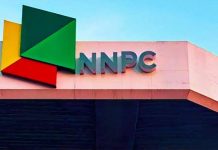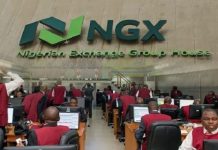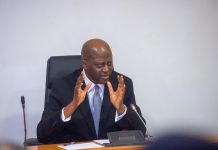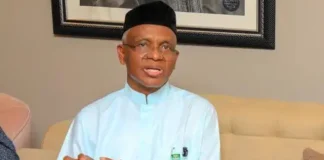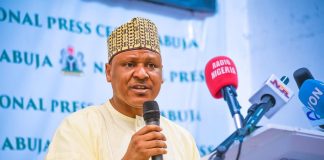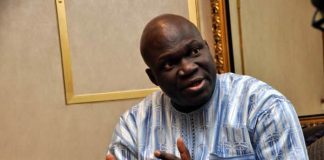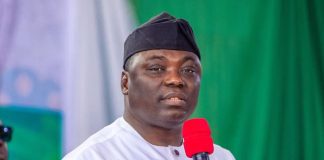🌿 Ruzu Non-Alcoholic Herbal Bitters
Ruzu Non-Alcoholic Herbal Bitters is a natural health supplement specially formulated to:
- ✅ Promote general wellness
- ✅ Detoxify the body
- ✅ Support the treatment of various ailments
Made from a powerful blend of 100% organic and medicinal herbs, Ruzu is completely alcohol-free, making it ideal for:
- 👪 All age groups
- 🌱 Health-conscious individuals
- 🌿 Anyone seeking non-alcoholic herbal remedies
Whether you're looking to boost your vitality, cleanse your system, or support healing the natural way, Ruzu Bitters offers a trusted herbal solution.
The largest economy in Africa may be turning the corner, as evidenced by the International Monetary Fund’s (IMF) recent revision of Nigeria’s GDP prediction to 3.9% for 2025 and 4.2% for 2026.
Stronger investor confidence, more oil output, and a more accommodative fiscal posture are the main factors behind the improvement.
The revised numbers were included in the IMF’s most recent World Economic Outlook, which was published on Tuesday and was titled “Global Economy in Flux, Prospects Remain Dim.”
The improvement indicates fresh hope for the nation’s medium-term economic prospects and is a 0.5 percentage point boost from its prior prediction.
Volatility—oil price shocks, inflation, currency instability, and a growing poverty gap—has characterized Nigeria’s economy for many years.
Before President Bola Ahmed Tinubu took office, Nigeria’s inflation rate hit 22.41% in May 2023, with food inflation hitting 24.82%, the highest level in 20 years.
Nigeria had a disjointed currency rate system by 2023, which encouraged roundtripping and rent-seeking. Although the CBN used billions of scarce reserves to protect the naira, monetary policy confidence declined.
While the nation’s GDP was 2.74% in 2023, gross foreign reserves were $34.96 billion, but actual usable reserves were far lower because of forward contracts and currency swaps.
Imports and investor fund repatriation were further limited by the backlog of unmet foreign exchange obligations.
Nigeria’s economy was practically insolvent in terms of functionality by May 2023. The nation had lost its fiscal independence and was now mostly dependent on external loans, CBN overdrafts, and opaque subsidy finance to remain afloat.
Real earnings were undermined by inflation, corruption was aided by exchange-rate manipulation, and institutional trust fell to its lowest level in decades.
However, 2025 is looking different as the IMF’s updated outlook attributes the turnaround to a combination of economic diversification, monetary tightening, and fiscal restraint.
A rebased GDP, the first since 2014, which showed a more dynamic economic structure, is at the center of these changes. A move away from reliance on oil is indicated by the increasing prominence of industries including professional services, entertainment, and digital technology.
In September 2025, Nigeria’s annual inflation rate dropped to 18.02%, the lowest level since May 2022.
As of Thursday, September 25, 2025, Nigeria’s external reserves reached $42.225 billion, the highest level in more than six years, surpassing the $42 billion milestone as well.
A deeper story of reform, resiliency, and the strategic vision of Nigeria’s Minister of Finance and Coordinating Minister of the Economy, Wale Edun, may be found behind the data.
He has become known as a quiet reform architect since taking office. He has been leading Nigeria through a number of daring policy initiatives and is well-known for his technocratic accuracy and astute business sense.
Working closely with the CBN, he has assisted in tightening monetary policy to fight inflation and stabilize the naira. The administration has prioritized fiscal transparency by boosting revenue collection, reducing waste, and cleaning up state finances.
Foreign investors have also renewed their interest in Nigeria as a more predictable and investable market as a result of the administration’s changes.
The indicators are encouraging for the time being. Nigeria is recalibrating, not just existing. And the nation’s economic narrative is being rebuilt with direction, accuracy, and a fresh feeling of possibility under Edun’s leadership.
Leading economists in the nation have also endorsed these encouraging indicators.
The CEO of Financial Derivatives Company (FDC) Limited, Bismarck Rewane, asserts that Nigeria’s economic recovery is genuine and long-lasting.
Speaking at the Lagos Business School (LBS) breakfast session, Rewane presented a paper titled “Reality Check: Is Nigeria’s Economic Recovery Authentic?” Indeed, it is.
After a period of contraction or downturn, he defined economic recovery as the stage of the economic cycle when growth restarts.
The economist claims that improvements in important metrics including GDP growth, inflation stabilization, employment rate, and heightened consumer and corporate confidence are what define Nigeria’s present recovery.
He noted that the pump price of gasoline, which had increased significantly following the elimination of subsidies, had decreased from N985 per litre in September 2024 to N841 in October 2025 when he compared the most recent economic data with those from the previous year.
He said that once the FX market was liberalized, the foreign exchange (FX) rate, which was approximately N1,900 to the dollar in February 2024, increased to N1,488 in October 2025.
“Nigeria’s economy frequently stabilizes slowly at the bottom after periods of economic contraction or downturns,” Rewane stated.
“In certain situations, the recovery is stopped, but in others, it progressively returns to a course of sustained development.”
With stabilizing economic factors, growing investor and consumer confidence, and GDP growth hitting a four-year high of 4.23 percent, Rewane claimed the current recovery is “near dynamic equilibrium.”
According to the economist, the difference between the official and parallel windows has shrunk to N24, indicating a change in the FX rate mismatch.
This recovery is distinct from previous ones. “Some fundamentals are changing; it’s not just about growth,” he stated.
Despite the encouraging statistics, there is a rising demand for prudence as Nigeria pursues its ambitious economic reform plan.
Edun and his team have been challenged to strike a balance between social sensitivity and economic restraint because recent initiatives, which were intended to promote long-term stability, have caused widespread misery throughout the nation.
Dr. Matthew Verghis, the World Bank’s Country Director in Nigeria, called on the Federal Government to address inflation, especially food inflation, a few days ago in order to close the gap between the reforms and their effects on the populace.
Despite the benefits of the reforms, Verghis pointed out that poverty was still a major problem and that many Nigerians were still dealing with diminished purchasing power in the World Bank’s most recent Nigeria Development Update (NDU) report, “From Policy to People: Bringing the Reforms Gains Home,” which was published in Abuja on Wednesday.
“Structural reforms targeted specifically at reducing food inflation, which is driven by deep-seated supply and market inefficiencies, must be implemented in conjunction with these monetary and fiscal policies.”
Similar to this, Muda Yusuf, the CEO of the Centre for the Promotion of Private Enterprise (CPPE), acknowledged that although the government has carried out bold changes in the past two years, Nigerians have suffered temporary hardships as a result of these actions.
In order to safeguard disadvantaged households and keep public support, he suggested that these reforms be supported by targeted social protection programs, such as cash transfers, food security interventions, and job-creation initiatives.
In the future, Nigeria should concentrate on increasing economic diversification through the expansion of value addition in solid minerals, manufacturing, and agriculture.
“The government must improve fiscal responsibility and management, increase transparency, and lower the cost of governance in order to strengthen governance and institutions,” he stated.


